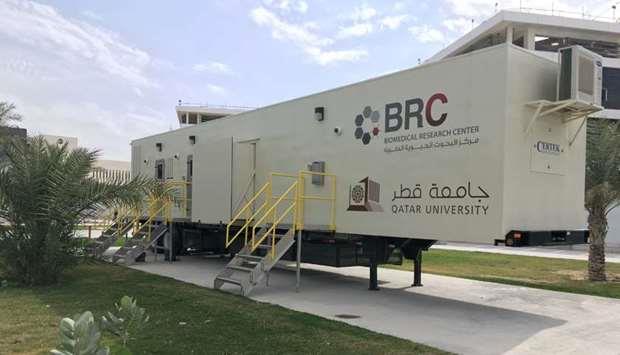
Qatar- QUBRC records rapid growth in published medical research
(MENAFN- Gulf Times) The Qatar University Biomedical Research Center (QUBRC) has achieved rapid growth in the number of medical research papers published in prestigious international journals, recording 275 this year. Launched in 2014, the QUBRC is now one of the most important research centres in QU. During the last three years, it recorded a significant increase in published research. The number increased from 134 in 2018 to 223 in 2019 to reach 275 this year.
The data indicate that the number of new and ongoing research projects reached 72 this year, including special research projects to counter the novel coronavirus which causes Covid-19, in co-operation with other research centres at QU and partners from inside and outside Qatar. This is compared to about 20 researches registered in 2017, 2018 and 43 projects in 2019.
These research projects come within the framework of QUBRC's endeavour to provide practical and logistical measures to support multidisciplinary medical and vital research that is not available at QU colleges, as part of its commitment to improve the health of Qatar residents and contribute to facing emerging health challenges.
QUBRC director Dr Asma al-Thani told Qatar News Agency (QNA) in an interview that the implemented research projects are great achievements, since its actual launch six years ago, stressing the need to move forward in facing health challenges and achieving the goals, objectives and strategies of research and innovation in the country.
QUBRC, established according to international standards, is committed to improving the health of Qatar residents by conducting research, training and providing services in the field of applied and theoretical biomedical research in several important areas.
There are researches concerned with early diagnosis, treatment and prevention of infectious diseases and metabolic disorders, which include cardiovascular disease, type 2 diabetes, obesity and cancer.
In addition to genomics and alternative medicine in co-operation with relevant research institutions such as Hamad Medical Corporation, Weill Cornell Medicine-Qatar, Sidra Medicine, Qatar Biomedical Research Institute and Qatar Anti-Doping Laboratory, one of the most important features of QUBRC is establishing a laboratory that corresponds to the third level of biosafety levels by CERTEK International, which is licensed by its origin country, the US.
It includes new and rare units such as a zebrafish research unit that is used as a model to study many genetic diseases in order to match it with the human genetic structure by 80%, such as the gene that causes enlarged heart disease. In addition to its reliance on advanced technologies similar to those applied in developed countries to study the genetic sequence, Dr Asma al-Thani said.
In this context, QUBRC seeks, in co-operation with local bodies inside and outside the university, to decode the genetic code of various endangered animal species within the framework of the recently established programme for environmental genome research.
This project came as Qatar was chosen to follow the path of sustainable development, making it the focus of the national development strategy and also for the expansion of the industrial sector in the country, she said, adding that the urban environment, in light of these data, will be required to preserve local species.
Regarding Covid-19 research, Dr Asma al-Thani said that QUBRC is keen to harness all its efforts, expertise and capabilities to serve the public interest in the light of any developments related to health, prevention and safety for individuals and society.
QUBRC has started many researches to study emerging viruses, including the novel coronavirus. Among them is a detailed study on cases infected with this virus, which is being done in collaboration with QU College of Medicine and the Ministry of Public Health (MoPH). Another one is using digital simulation technology to test the ability of some inhibitors to stop the novel coronavirus binding to its cellular receptors.
QUBRC is also studying the genetic evolution of seasonal and zoonotic coronavirus that infects humans. Another research is in collaboration with Qatar Founation's Hamad Bin Khalifa University to study the evolution of the coronavirus (Mers) that causes respiratory syndrome in humans and camels in the Middle East.
Among the studies that have been carried out and published in this regard, are a comparative study on the presence and amount of anti-coronavirus antibodies against seasonal and zoonotic coronaviruses in humans in Qatar, and one on the complete structure of the coronavirus spike protein (viral thorn) and its pre-bonding form with cellular receptors, in co-operation with external research centres.

Legal Disclaimer:
MENAFN provides the
information “as is” without warranty of any kind. We do not accept
any responsibility or liability for the accuracy, content, images,
videos, licenses, completeness, legality, or reliability of the information
contained in this article. If you have any complaints or copyright
issues related to this article, kindly contact the provider above.

















Comments
No comment